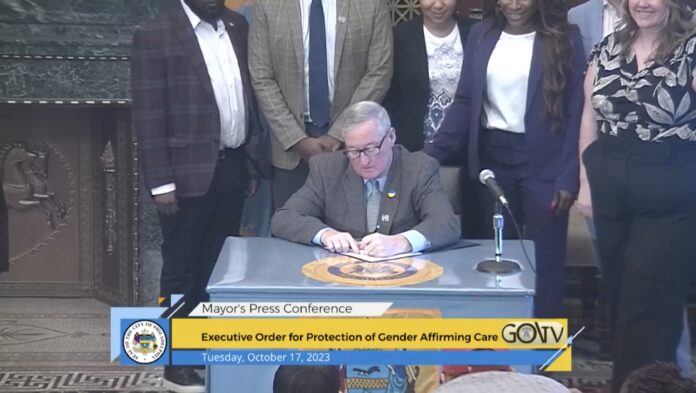
Mayor Jim Kenney on Tuesday signed an executive order that protects trans and gender-expansive individuals seeking and receiving gender-affirming care in Philadelphia, as well as local health care professionals who provide that care.
“This executive order demonstrates once again that Philadelphia truly is a welcoming city, a place where all people can be treated fairly with dignity and respect,” Kenney said at a press conference where he signed the order.
Executive order 4-23 states that “all members of the executive branch shall, to the fullest extent of their authority and ability, take steps to protect the ability of individuals and entities in Philadelphia to seek, travel to obtain, provide, receive, or assist in providing and receiving gender-affirming health care services.”
The order prohibits local government officials from giving information to or aiding investigations that would penalize residents or visitors who seek gender-affirming care in Philly, barring state or federal law requirements.
Plus, the order dictates that if state or federal laws criminalize gender-affirming health care, Philadelphia lawmakers will “deprioritize enforcement of crimes related to providing or receiving such gender-affirming health care services.”
“This executive order reflects the city’s commitment to the full inclusion of the LGBTQ+ community, and strengthens Philadelphia’s reputation as a welcoming city,” Josie Pickens, chief diversity, equity and inclusion officer in the Mayor’s Office of Diversity, Equity and Inclusion, said at the press conference.
In a political climate where legislators in many U.S. states are restricting and banning gender-affirming care for trans people, this executive order is seen as a much-needed safeguard for trans and gender-expansive individuals who need gender-affirming care.
“Our transgender and gender-expansive community is a vital part of our city — as parents, neighbors, friends, family, co-workers, business owners, city employees and so much more,” Celena Morrison, executive director of the city’s Office of LGBT Affairs, said at the press conference. “As such, Philadelphia and this administration has long been committed to promoting the equal rights and protections of trans and gender-expansive communities. The Philadelphia Fair Practices Ordinance already prohibits discrimination based on a person’s gender identity, but our transgender and gender-expansive community is still under attack.”
Currently, five U.S. states passed outright bans on best practice medical care for trans youth, according to the Movement Advancement Project. Those states are Florida, Alabama, Oklahoma, North Dakota and Idaho. Twenty-one U.S. states have passed bans on best practice medical and surgical care for trans youth, but thanks to legal challenges, not all state bans are necessarily in effect. Pennsylvania currently has no such ban.
“People are in search of new affirming places to call home, and Philadelphia shines as a beacon of safety,” Darius McLean, chief operating officer at William Way LGBT Community Center, said at the press conference. “With LGBTQ+ nondiscrimination protections that go above and beyond what even the state of Pennsylvania currently offers, Philadelphia has positioned itself as a refuge for our community and parents who wish to raise their kids in an LGBTQ+-affirming place.”
The Movement Advancement Project also indicates that Pennsylvania does not currently have a shield law that protects access to transgender health care, nor does it have a law that bans health insurance providers from excluding coverage of gender-affirming health care.
“Today’s executive order sends a message that we love our trans family and want you here in Philadelphia,” Sultan Shakir, president and executive officer at Mazzoni Center, said at the press conference. “Today’s executive order also sends a message that we respect and value our medical providers here in Philadelphia — our doctors or nurses or medical assistants, our front desk staff, our facility staff, all of whom are working to provide care to a community that is increasingly under attack.”
Bri Golphin, organizer with Philly Trans March, has been advocating and fighting with other local activists, separate from the Office of LGBT Affairs, for Philadelphia to become a safe haven for gender-affirming care.
“An actual legislative bill would have have been better instead of this executive order,” Golphin told PGN. “That’s what we were aiming for.”
The order also states that people in city jails will have access to “medically necessary gender-affirming health care that is appropriate to the duration of custody and consistent with the recommendations of their health care providers, accepted gender-affirming health standards, departmental policies and applicable law.”
“If it’s actually implemented,” Golphin said. “There’s other folks doing work around [trans people] who are in city jails, and they’re telling me that folks can’t even get their actual medication. Also, how are folks in city jails going to know about this law? I doubt some of the [corrections officers] would even mention it.”
Passing an executive order of this nature “is something that we’ve been calling for as a call to action for human rights in the trans community for many, many years,” human rights advocate Kendall Stephens told PGN.
“A lot of our rights have been erased in every system you can imagine,” Stephens added. “It’s a relief to know that the medical system, at least in Philadelphia, is one system where we can expect to have our dignity.”
Stephens has and continues to benefit from gender-affirming care, she said. “I do not believe that I would still be alive today if I had been denied that care throughout my lived experience as a transgender woman.”